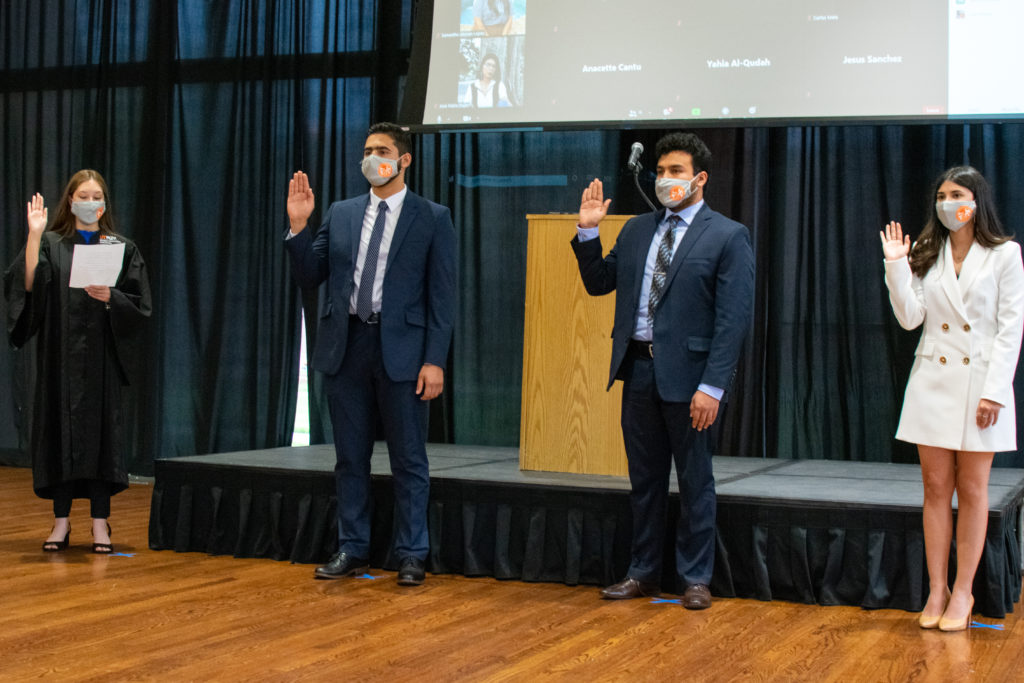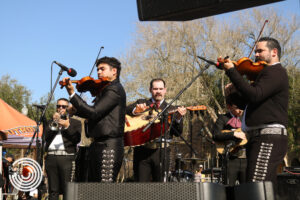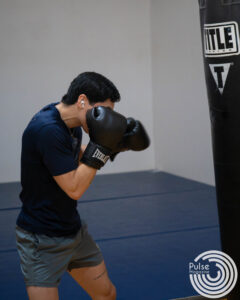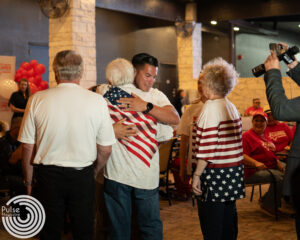Team Vision United: the new SGA

Cutline will go here. SOL GARCIA/PULSE MAGAZINE
Student Government Association Chief Justice Samantha Lara (left) recites the oath of office to Yahia Al-Qudah (second from left), the vice president-elect for Brownsville; José Pablo Rojas, president-elect; and Anacette Cantu, the vice president-elect for Edinburg. The hybrid ceremony was held on April 22. “We must prove to the people that have placed us in this position that we will put our own personal interests aside and speak out on the issues that affect our students,” Rojas said after the other newly elected SGA executives spoke.
On April 22, 2021, the new Student Government Association (SGA) members were officially inaugurated. During the campaign, they were known as “Team Vision United.” The team consisted of José Pablo Rojas, Yahia Al-Qudah and Anacette Cantu.
Rojas will be the SGA president for the upcoming academic term. He is a senior with a major in biology and a focus on biological sciences. He has two certifications in etymology and social sciences. Prior to running, he was the program director for the First-Year Internship (FYI) program this academic term.
Al-Qudah will be the SGA Vice President based in Brownsville. He is a junior with a major in biology and a minor in chemistry. Like Rojas, he also holds a position in the student government as the Senate Chair.
Cantu will be the SGA Vice President in Edinburg. She is a junior majoring in accounting and a senator for the Robert C. Vackar College of Business and Entrepreneurship.
Despite their different backgrounds and experiences, they all have common goals they want to achieve in their new positions. They believe in truly listening to the student body to help shape their term and plans on how to improve experiences at the University of Texas Rio Grande Valley. During their campaign, they proved that they do work well as a team and show how much they value communication. Not only do they rely on each other’s ideas, but they have gone out of their way to reach out and communicate with the student body to get a better idea on how to represent them.
——–
QUESTIONS:
- How did you all meet and eventually decide to form the team and run together?
ROJAS: “I was already part of the Student Government Association since 2018. I started off as a first-year intern and after that I became a senator of the last term. I became a senator in January of that academic year and shortly after, Yahia became a senator. He came in, saying hi to everyone and I was like, ‘OK, who is this guy?’ and that is how the friendship started. He served as a chair of the senate throughout this term, and I became the First-Year Internship program director. And then we met Anacette. Me and Yahia were thinking about running for this term for some time. I spoke to Yahia and I told him that we need a third running mate and the third running mate has to be from Edinburg. Yahia is from Brownsville and I’m from Brownsville, but I travel between Brownsville and Edinburg, between the two campuses. And Anacette is from Edinburg. I told him we needed someone who is hard working, that can be able to speak to others, to be able to lead with compassion and has passion to serving [the] student body, to be of service to people. The first name that popped into Yahia’s head is Anacette and I was like, ‘OK.’ I texted Anacette, and it was a bit random. I was like, ‘Anacette, can I call you?’ and she was like, ‘Yes?’ Then we got in the call and I explained it to her; ‘Anacette, I want to run for the presidency and Yahia is going to be one of my running mates. I would like to have you on’ and that is how it started. A lot of prepping and she said yes. Now here we are; we ended up winning.”
- Did you have hesitations about running? Were you nervous about anything?
ROJAS: “Me personally, I had no reservations. Obviously yes, I was a bit nervous. Mainly because I am mindful how important it is, how important these positions are. Because they are basically the direct pathway between administration and the student body. We have the ability to actually get things done for solving any student concerns, so I am mindful of that part. But I am also eager because it was something we were thinking about for a long time and I was part of the First-Year Internship program back in 2018. Never did I think that I was going to be the next president of the student government, so for me its kind of a full circle type of thing.”
AL-QUDAH: “[From] my end, when it comes to my end, so there are a lot of expectations, a lot of responsibilities, for holding these positions, and it’s not something we can say, ‘Oh, it’ll be easy.’ It is something we have to prepare for weeks in advance. Our policies, our platforms, what exactly we want to accomplish. We have to have monthly meetings with administrations, find a good pathway to communication with students. So, it is definitely not an easy path, but it is worth it. That’s what makes it exciting because there are a lot of different possibilities and us three, we really want to put in all of our effort. Even by being students, we want to go above and beyond and try our best to try and serve the institution to the best of our abilities.”
CANTU: “As far as reservations and just expectations about this position, after [Rojas] made that call, I was very honored to be considered with this team because I know what an amazing job they did within SGA. I know how hard they worked during the time this year. As far as within the Senate, [Rojas] ran a great FYI program, Yahia a great Senate as chair. And I just let [Rojas] know, ‘Look, I am very intricate, but before I say yes I want to make sure I can commit my time and do the best possible job as the vice president,’ because like they said, it holds a lot of responsibility and we want to do the best for the students. So, he said, ‘OK, Anacette, but I’m giving you a month.’ So, then I figured out my schedule and said, ‘You know what, I can do it. I can have my time commitment. It all works out with work and with school.’ And now, here we are. I am very excited to get to work and work with such a great team.”
- During the campaign, what helped you cope with the stress? What were your support systems during the entire process?
ROJAS: “I would say each other. Pretty much each other. … We were always on call with each other almost every single week. We met through Zoom and every single week we would have phone calls. We made sure to rely on each other for support because we weren’t doing this by ourselves; we were a team. That is the one thing I told Anacette and Yahia before we even started, that if we were going to run and if we going to get [the positions], it is all going to be teamwork. It is not going to be just one of us calling the shots; we are going to have each other. Each one of us is different and each one of us represents different factions of the university. That unified can do a lot. During campaigning, that is what we had to do. We had to be mindful of everything going on, especially because we are in a pandemic. We had to make sure [we] held each other accountable. The occasional watching of TikToks also helped destress and that was also very helpful.
AL-QUDAH: “On my end, when it came to destressing and stuff like that, as JP said, us three were a very good kind of support system for each other. We always had each other’s back whenever there was an issue or a problem. As a team, we’re able to figure things out because we all come from different paths, different backgrounds and we all have different experiences. But, all three of us, are leaders, student leaders and we function in that way. That just makes us able to really collaborate with each other and the partnership between us is very much a collaborative partnership. It is not like somebody tells others what to do, it is very much like we are a team and we motivate each other and push each other to be better. In terms of other support systems, we all, thankfully, are blessed to have families that are able to provide support systems for us. There were many, many times where we felt like it was tough, but we always told ourselves to fight like we are losing the battle, even when we thought we were winning. That was one thing that really helped us win the election, that mindset that even when we think that we’re winning, we fight like we are losing.”
CANTU: “Just to piggyback off what they said, we are really fortunate to have each other as a team and it was a really unique experience during the campaign to see how we would work together. Thankfully, we work together very well. Our personalities really complement each other. There are very different aspects [of our personalities]. We are different in our own ways, but together we work very well. Like Yahia said, we also have very supportive parents to be there to support us when we were feeling stressed and overwhelmed. There was even a day we went out to Brownsville and took all of our pictures, and there was my mom and my dad taking so many pictures. It was such a fun campaign process. At the end of the day, we did win and we’re very grateful, but it was also fun to do it with them.”
- How, as a team, did you come up with a solid plan of what you wanted to achieve during your term?
AL-QUDAH : So our plan system, when it came to creating it, all started with what we experienced ourselves as students. So, we all kind of put our heads together and brainstormed with what we can improve in the university. Other than that, what really helped us was helping with students and organizations. During the time of our election campaign, we actually met with over a dozen student organizations and [we] discussed with them what they have experienced, what can be improved in the university. So, its not like we’re getting these ideas out of nowhere. These ideas have been talked with many students and organizations. We talked with various student leaders and were able to get various opinions about what to change in the university, what can be changed, how to change it, etc. So, after taking in all the information, we just condensed it to make it simple for students to understand our campaign. We made a PDF formatted PowerPoint and posted it on our social media pages so students can see all the things we care about. One thing we made clear for students is, whatever they care about, we care about. Its not like our agenda is set. If there is something students bring up to us, we absolutely will work on that. We are not waiting for our term to start. For the past few weeks, we have been meeting with university administration in getting the transition process. Actually, speaking of students, for example, I have been working with a student on work-study. When can be the soonest work-study option available post-pandemic? I helped him find that answer and I helped him find that way. So, it is through brainstorming with each other, communicating with students and student organizations, and speaking with the administration to basically just figure out that kind of direction of where we want to go. The ideas we had after speaking to administration for the past few weeks, we are confident that much of it will get accomplished. We have been getting positive feedback from administration about many of our proposals. So, we are happy to push that throughout the academic term.
- Since this election was so different because of the ongoing pandemic, did COVID-19 make it difficult to communicate with the student body? As the university starts to open back up, how is that communication going to change?
ROJAS : Yeah, it is very unfortunate in the situation that we are in because it is a pandemic and you have to be mindful about that. It did make it a bit difficult getting into contact with students because most of the contact you would have with students would be in person. We had already known some organizations prior to that. I was building up this project called The Collegiate Advisement Student Advisory Councils (CASAC). It is basically a council that will be implemented in every single college so that leaders of every single organization that is under that respective college will come together, and meet with their representative from student government and the dean of that college. I had been meeting with a ton of student leaders around the university and some of them reached out and were like, ‘Hey JP, we saw that you were running,’ and I told them, ‘Yes, I am running.’ That is how we kept the ball rolling. I already had some communication with them regarding a project I was already doing for the student body, so we were already out there trying to make something for the student body. So when we decided to run, that’s when people decided ‘Oh , we’re going to vote for this person,’ or ‘We already know this person, we know how they work. We know they care for the student body.’ And also reaching out to friends, ‘Hey I’m going to run. This is what we want to do. Tell you friends.’ That’s how it goes, if you have one friend, that friend has ten other friends, and so on and so forth. If they like what you have to say and the way that you say it, and it says a lot about it. And they like our platform so I guess it all works. People we didn’t even know ended up campaigning for us. Some people in the student’s page [on Facebook] when we kept on posting about what we wanted to do, reached out to me and said, ‘I like what you have to say,’ and they said they got my flyer and shared it with their friends, and they were a part of. They told their families and their friends at the university, so I think it really helped in that aspect.
AL-QUDAH: We also took time to actually go on campus. We wore masks and we’re actually all vaccinated so it was good. We went to campus and there were not many students around but there were still some. We left flyers around for them to pick up on tables, we put flyers up all around campus, and on those [flyers] we also have some of our very important policy items. That was also a great source of communication with students. Many students still go to university [in-person], of course not nearly as much as we used to, but there are still some classes at that time that were hybrid or completely in-person.
- Now that you are inaugurated, is there anything you are nervous about, going into the new term? Similarly, what is the thing you are most excited about?
AL-QUDAH: What we did is that we split our term into sections. We have an idea of what we want to do in the summer, in the fall and in the spring. We kind of split our platform up into those categories; into what is the highest priority like going back to school and modalities. Those are some of our summer plans. We also have the CASAC program, where we want to initiate bringing student leaders into a representative system in their colleges. We also want to do a SGA constitutional convention because the constitution needs an update badly because when it was made, the students at the time could not see where UTRGV is now, which is a multi-school and multi-location university. We need to have representatives for Harlingen and Weslaco, and not just the Edinburg and Brownsville campuses. We are also looking for a graduate part of our constitution, or a separate student government specifically for the graduate school, because right now the Student Government Association is in charge of the undergraduate and the graduate [colleges]. We believe that potentially splitting these two would be beneficial because two different aspects and two different types of life. You know, it is different courses, different systems, but that is still in the talks. We have been able to meet with the graduate colleges and they gave us positive feedback. So, there are a lot of things we want to do and we have done our best to split them up in terms of priority. Not only are we excited for that, but also nervous because we want to live up to those expectations. But we also want to go beyond those expectations. We don’t want to let the people that voted us in, or even the people that did not vote us in… we don’t want to let anybody down. We want to make sure SGA’s reputation is kept as a student governmental body that actually represents the student body and fixes the issues within the university.
ROJAS: I think what’s really going to help us is that we planned everything out and how we are going to go about things every month. Obviously, things come up and we adapt. So that is one of the best things we can do sometimes: adapt. If other things come up, then we’ll address them. The great things is about us is that we’re going to separate our agenda items internally and externally. One of the vice presidents will be focused more on the external aspects of the student government and the other vice president will be more focused on the internal aspect. I, myself, will be dabbling into both, and then whenever we need to work as a team in either of those aspects we will be able to do so. We know for a fact that at least one person has their full focus on internal issues or external issues.
- Is there anything you want to address to the student body? Anything you want them to know personally?
Al-QUDAH: We really want to urge students to apply for this upcoming term for SGA. The new term begins May 3rd , and we want to work on a very important goal for us which is to fill-up the student government association. That is still one thing that has never been done since 2015. We’ve always had many spots open in SGA, so a very important aspect is to fill up the Student Government Association for the 2021-2022 SGA term.
ROJAS: Yeah, so everyone is welcome to apply. We really want to make sure that we have enough representation so that we can begin to cover every aspect of the university’s issues. I always like to say that we are shaped by different experiences and those experiences can be able to help us resonate with those people who put us into these positions. And we can be able to, if not lead the way, but find those and highlight those that can be able to speak on those issues and find a solution that can alleviate those problems. For the student body, thank you so much using your voice, you vote. For voting the people you wanted to represent you. Regardless of the outcome, everybody should use that right to vote. Every student at UTRGV was eligible to vote and it is very important to exercise that right because it defines what the university will be like for the next academic term as the SGA executives and other representatives of the student government.







